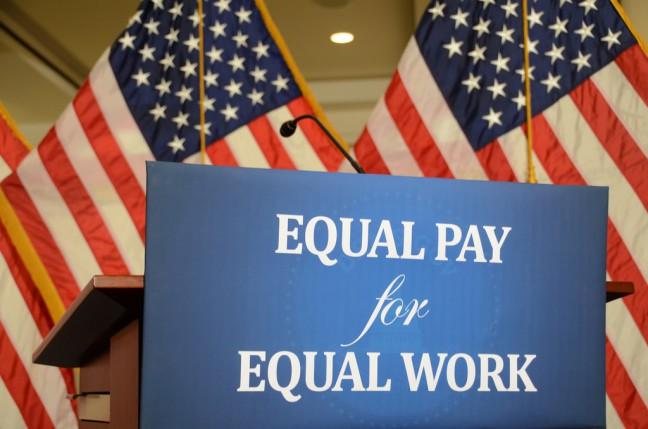On the seventh anniversary of the federal Lily Ledbetter Fair Pay Act, legislators are still working to address the importance of providing equal pay and reduce the wage gap in Wisconsin.
The Lily Ledbetter Fair Pay Act is a federal law President Barack Obama enacted in 2009 after a woman, Lily Ledbetter, discovered she had been paid less than her male counterparts for 20 years, Rep. Lisa Subeck, D-Madison, said. Lebetter, a former Goodyear Tires employee, filed a lawsuit in the federal Supreme Court against the company, but was told her case was invalid. This was because she could only have sued for pay discrimination at the time she received her first paycheck and not 20 years later, Subeck said.
The act prevents such incidents from happening in that it resets the time period under which a person can sue for pay discrimination, Subeck said.
“Every time you receive a paycheck that is less than your male counterparts’, that time period under which you can sue will restart,” Subeck said. “So the act gives someone like Lily Ledbetter the ability to sue even if they don’t learn of the pay discrepancy when it had first started.”
But under the law, people can only sue in the federal court, Subeck said. To make this process easier, states implemented individual equal pay laws based on the Lily Ledbetter Act that allow people to sue in state courts instead, she said.
Wisconsin implemented its own equal pay act, which Gov. Scott Walker and Republican legislators repealed in 2012, Subeck said.
Wisconsin is one of only five states in the nation that does not have a state-level equal pay act, Subeck said.
“The [repeal of Wisconsin’s equal pay act] really took us backwards and set us apart from most states,” Subeck said.
Rep. Katrina Shankland, D-Stevens Point, said women in Wisconsin make on average 78 cents for every dollar their male counterparts make. She said this ratio is even lower for women of color, who receive 64 cents and Latina women who earn 56 cents for every dollar made by a white, non-Hispanic man.
Subeck said this pay gap negatively impacts Wisconsin’s economy because it reduces a woman’s ability to spend. Shankland also noted many women are the primary breadwinners in their family and need equal pay for financial security.
“This is not only holding back our economy, but is also preventing women from investing in their dreams whether it’s starting a business, being able to pay their student loans or buying a house,” Shankland said.
In 2012, shortly before the repeal of Wisconsin’s equal pay act became law, Wisconsin Civil Justice Council released a statement against the act saying it made it unnecessarily expensive for companies to cover pay discrimination lawsuit costs. Created in collaboration with other pro-repeal organizations, such as Wisconsin Manufacturers and Commerce, Wisconsin Builders Association and Wisconsin Hospital Association, the statement said women could still sue in federal court with the repeal.
According to the statement, the number of cases filed for pay discrimination did not increase under the equal pay act. Even before the act existed, employees who were discriminated against could seek reinstatement, back pay for up to two years before discrimination and coverage of court proceedings. The repeal maintains these benefits, the statement said.
The statement’s authors called the act “unduly burdensome on Wisconsin employers.”
Subeck said there is more than one cause for the pay gap than just the lack of an equal pay law in Wisconsin. Allowing time off to take care of children or sick relatives, giving access to high quality health care and family planning services would go a long way in improving life in the workplace for women, she said.
Democratic U.S. Senate candidate Russ Feingold said in a statement much more must be done to ensure women “have every opportunity to succeed” and advocated raising the minimum wage and increasing access to reproductive health care in addition to creating equal pay legislation.
Shankland said other legislation could be helpful in reducing the pay gap in the state. One such piece of legislation is the 12-Month Contraceptive Care Act, which would allow any woman who received an initial three-month birth control supply from her insurance providers to get a 12-month supply filled.
Bill would give women year long access to contraceptive pills
Subeck said she has also introduced a bill to make it easier for new mothers to return to work. It would allow them to breastfeed their children in safe and adequate places at their workplace without the risk of losing their health insurance, she said.
Restoring the Wisconsin Equal Pay Act would still be most efficient way to reduce the wage gap and improve women’s rights, Subeck said. The legislation, however, still needs Republican support, she said. Shankland said Rep. Christine Sinicki, D-Milwaukee, has introduced the act twice and not received a hearing, but will keep trying in the future.
“We’ll keep on fighting for equal pay for equal work,” Shankland said.





















